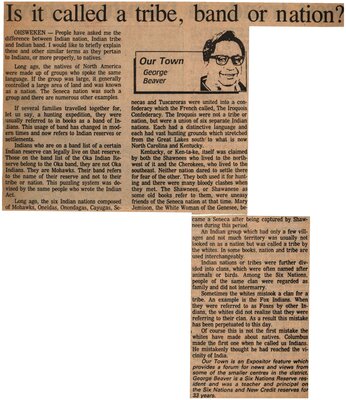"Is It Called a Tribe, Band or Nation?"
- Publication
- Brantford Expositor, 1989
- Full Text
- Is it called a tribe, band or nation?
OHSWEKEN - People have asked me the difference between Indian nation, Indian tribe and Indian band. I would like to briefly explain these and other similar terms as they pertain to Indians, or more properly, to natives.
Long ago, the natives of North America were made up of groups who spoke the same language. If the group was large, it generally controlled a large area of land and was known as a nation. The Seneca nation was such a group and there are numerous other examples.
If several families travelled together for, let us say, a hunting expedition, they were usually referred to in books as a band of Indians. This usage of band has changed in modern times and now refers to Indian reserves or settlements.
Indians who are on a band list of a certain Indian reserve can legally live on that reserve. Those on the band list of the Oka Indian Reserve belong to the Oka band, they are not Oka Indias. They are Mohawks. Their band refers to the name of their reserve and not to their tribe or nation. This puzzling system was devised by the same people who wrote the Indian Act.
Long ago, the six Indian nations composed of Mohawks, Oneidas, Onondagas, Cayugas, Senecas and Tuscaroras were united into a confederacy which the French called, The Iroquois Confederacy. The Iroquois were not a tribe or nation, but were a union of six separate Indian nations. Each had a distinctive language and each had vast hunting grounds which stretched from the Great Lakes south to what is now North Carolina and Kentucky.
Kentucky, or Ken-ta-ke, itself was claimed by both the Shawnees who lived to the northwest of it and the Cherokees, who lived to the southeast. Neither nation dared to settle there for fear of the other. They both used it for hunting and there were many bloody clashes when they met. The Shawnees, or Shawanese as some old books refer to them, were uneasy friends of the Seneca nation at that time. Mary Jemison, the White Woman of the Genesee, became a Seneca after being captured by Shawnees during this period.
An Indian group which had only a few villages and not much territory was usually not looked on as a nation but was called a tribe by the whites. In some books, nation and tribe are used interchangeably.
Indian nations or tribes were further divided into clans, which were often named after animals or birds. Among the Six Nations, people of the same clan were regarded as family and did not intermarry.
Sometimes the whites mistook a clan for a tribe. An example is the Fox Indians. When they were referred to as Foxes by other Indians, the whites did not realize that they were referring to their clan. As a result this mistake has been perpetuated to this day.
Of course this is not the first mistake the whites have made about natives. Columbus made the first one when he called us Indians. He mistakenly thought he had reached the vicinity of India.
Our Town is an Expositor feature which provides a forum for news and views from some of the smaller centres in the district. George Beaver is a Six Nations Reserve resident and was a teacher and principal on the Six Nations and New Credit reserves for 33 years.
- Mystery Question
- What is the date this article was published?[Please answer by clicking on the Comments tab]
- Creator
- Beaver, George, Author
- Media Type
- Newspaper
- Item Types
- Articles
- Clippings
- Description
- "People have asked me the difference between Indian nation, Indian tribe and Indian band. I would like to briefly explain these and other similar terms as they pertain to Indians, or more properly, to natives."
- Date of Publication
- 1989
- Subject(s)
- Personal Name(s)
- Jemison, Mary ; Columbus, Christopher.
- Local identifier
- SNPL002504v00d
- Collection
- Scrapbook #1 by Janet Heaslip
- Language of Item
- English
- Geographic Coverage
-
-
Ontario, Canada
Latitude: 43.06681 Longitude: -80.11635
-
- Creative Commons licence
 [more details]
[more details]- Copyright Statement
- Public domain: Copyright has expired according to Canadian law. No restrictions on use.
- Copyright Date
- 1989
- Copyright Holder
- Brantford Expositor
- Contact
- Six Nations Public LibraryEmail:info@snpl.ca
Website:
Agency street/mail address:1679 Chiefswood Rd
PO Box 149
Ohsweken, ON N0A 1M0
519-445-2954



